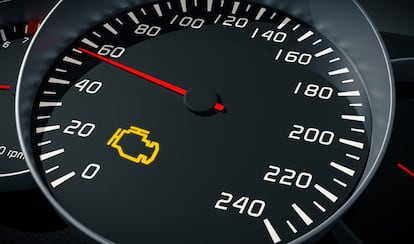What does it mean when a car’s Malfunction Indicator Light (MIL) goes on?
If the yellow engine symbol on the dashboard is illuminated, something is wrong. Here are the main reasons why that happens

A small, yellow engine-shaped light indicates that the car’s electronic system has detected a problem that needs to be checked. This warning light is known as the Malfunction Indicator Light (MIL).
The car’s MIL and vehicle inspections
The warning light should stay on when the ignition is switched on and go off when the car is started. If that doesn’t happen or the light comes on while you’re driving, you should go to a mechanic as soon as possible to inspect the reason for the problem and avoid even bigger issues.
Be careful, because if the warning light is on while the engine is running during a vehicle inspection, the car will not pass the test until the problem has been resolved.
The Engine Control Unit (ECU)
The engine control unit (ECU) is responsible for ensuring the proper operation of the engine’s various parts. It is a small electronic device that regulates functions like ignition and power supply. It also records the engine’s activity parameters. If the ECU detects that they are not normal, it warns the driver through the malfunction indicator light.
The reasons for the mechanical alert vary, but it’s always advisable to immediately consult a mechanic. The issues all affect important engine components, which can be damaged quickly or lead to more serious malfunctions. Such problems also jeopardize the safety of the vehicle.
Reasons why the malfunction lamp can come on
Below are the most common reasons why the malfunction indicator light would come on:
1. The engine is not running well in general. Something is wrong, and the electronic system detects excessive consumption (fuel or oil), excessive smoke (combustion failure) or an abnormal operating temperature (a failure in the cooling system).
2. The fuel supply is defective. The fuel pump or injectors fail, are dirty or in poor condition, which causes a decrease in power and makes the car jerk when accelerating.
3. The cause of the problem is the supercharger (turbo or volumetric compressor). The system, which serves to improve response and increase power, does not work well because one of its parts is damaged, or because it has not cooled properly.
4. Failure in the electrical system. Wires, connections and spark plugs can generate an error registered by the control unit and affect other engine components and their proper functioning.
5. Defective glow plugs. In diesel engines, the cylinders need to reach a certain temperature to start. That’s why they have special glow plugs, which deteriorate with use.
6. Damaged mass air flow sensor. This sensor calibrates the amount of air entering the cylinders and measures their temperature. It allows the electronic fuel injection system to deliver the precise amount of fuel required at any given moment.
7. The engine does not turn well. Moving parts such as the crankshaft or the camshafts are out of alignment, which affects general equilibrium and causes noises, vibrations and the improper functioning of the mechanics, which can ruin the engine if it is not fixed.
8. A problem with the lambda sensor (also known as the oxygen sensor). The sensor measures the gases in the exhaust and apportions the proper amount of fuel necessary for combustion.
9. EGR valve. This serves to recycle exhaust gases by reusing them in combustion to reduce emissions; its failure will increase consumption and reduce the engine’s power.
10. Damaged catalytic converter. Usage or a blow can affect the catalytic converter, which is responsible for avoiding an excess of harmful emissions into the atmosphere. If it breaks down, that will also affect engine performance and cause unusual noises and vibrations while driving.









































